Hello and welcome!
As I mentioned last week, I was very happy to take part in the Life Fest gathering, sponsored by the Sisters of Life and the Knights of Columbus.
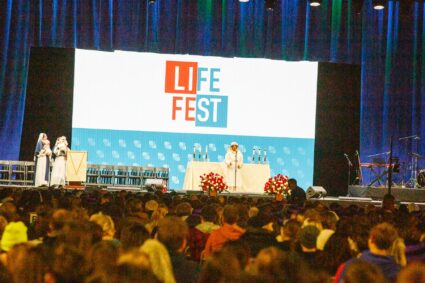 Despite the fact that there was considerable snow by Washington, D.C. standards, about 6,000 young people were able to gather for that event, which featured witness talks, confession, adoration and Mass.
Despite the fact that there was considerable snow by Washington, D.C. standards, about 6,000 young people were able to gather for that event, which featured witness talks, confession, adoration and Mass.

I was very pleased that so many priests and young people from Boston were able to be there with us.
I concelebrated the Mass with Archbishop Lori, the Supreme Chaplain of the Knights of Columbus, and I was very honored to be asked to serve as the homilist.
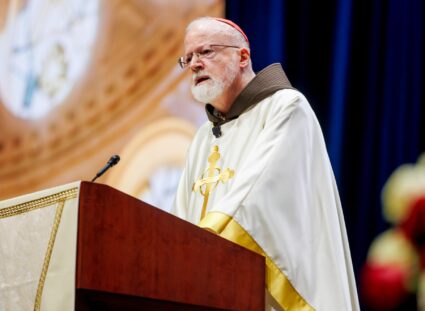
I just recently received the video of the conference, so I’d like to share the portion with my homily with you here. Of course, the video also includes the whole of the gathering, so you can view the rest of the conference, as well.
Saturday, the day after the March, I went to Georgetown University for their annual Cardinal John O’Connor Conference on Life. It is the largest and longest-running student pro-life group in the nation, and this year, they were marking the 25th anniversary of this annual pro-life gathering, which was named in honor of Cardinal John O’Connor, Archbishop of New York. It was founded, in fact, by Stephen Feiler, who now works in the central administration of the Knights of Columbus but, at the time, was a young student at Georgetown. I have addressed them in the past, but I was honored to be included in their Jubilee Year.
Our day began with a breakfast hosted by President DeGioia, with the student leaders of the conference and several members of the faculty, including John Carr and Kim Daniels. We had a fascinating dialogue with them.
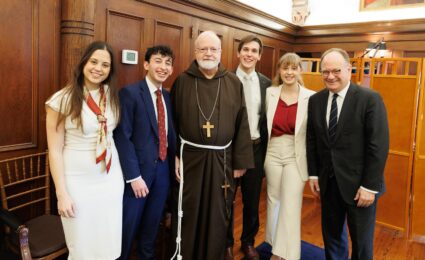
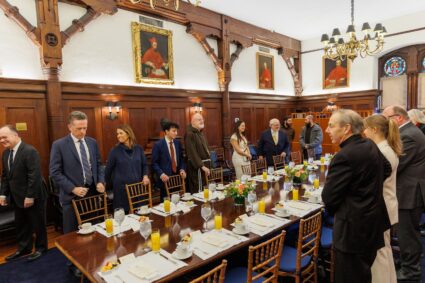
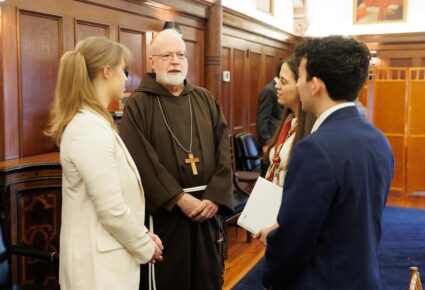
Afterwards, the program began.
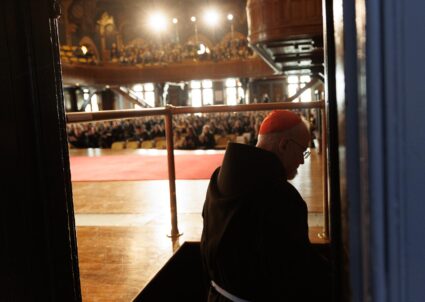
I started my keynote by speaking about my friendship with Cardinal O’Connor and experiences we had traveling together, particularly in Central America during the time of the wars there, as well as his commitment to the gospel of life and social justice.
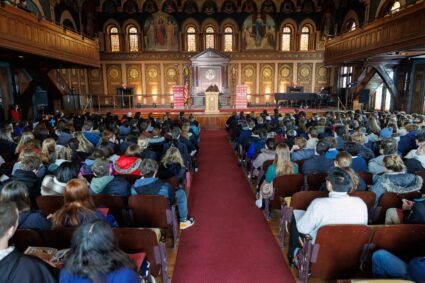
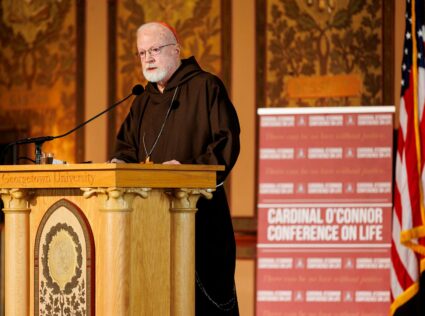
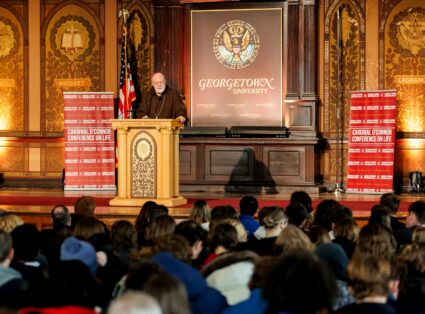
I went on to give a reflection on what I see as the state of the pro-life movement in the United States — where we are now and what we can expect in the coming years.
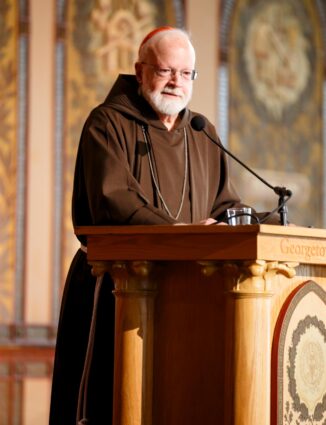
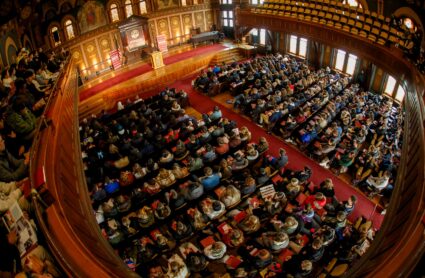
During the conference, they always honor another student pro-life group, and this year, they chose the group from Notre Dame University.
From there, I traveled to Rome for the plenary session of the Dicastery for the Doctrine of the Faith, which is held every two years.
One of our key themes of discussion was the validity of sacraments.
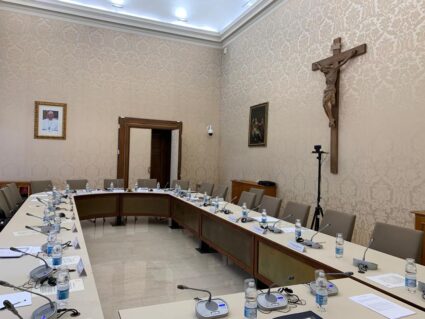
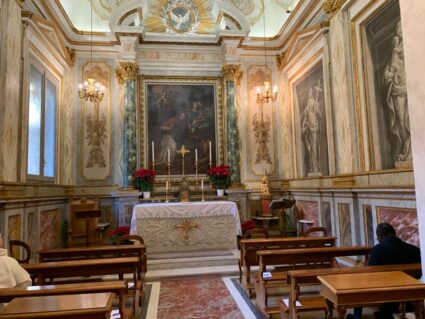
Wednesday evening, I had dinner with Father Joe Ferme, who is studying here and Father David O’Leary, who is doing his sabbatical at the Pontifical North American College and is having a very good experience.
To conclude our plenary session of the DDF, we had an audience with the Holy Father on Friday in the Sala Clementina.
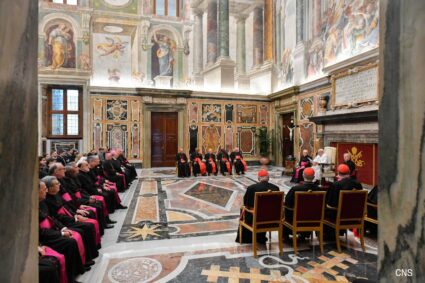
In his address, he spoke to us about the importance of the sacraments, which nourish and sustain the life of the Church and shared his hope that our document on dignity would help the Church to be close to those who suffer from injustice and oppression. He also spoke about faith, which he said is often rejected in today’s world.
He also addressed the Declaration Fiducia supplicans and stressed that these blessings do not require moral perfection and that they are not for the union, but for the individuals who request them.
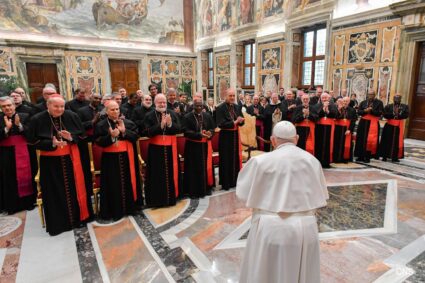
I’d like to share the full text of his address with you here:
Cardinals,
Dear brothers in the episcopate and the priesthood,
Brothers and sisters!I welcome you at the end of your Plenary Assembly. I greet the prefect and the other superiors, the officials and the members of the Dicastery: to all of you my gratitude for your valuable work.
As the Apostolic Constitution Praedicate Evangelium stipulates, “The task of the Dicastery for the Doctrine of the Faith is to help the Roman Pontiff and the Bishops to proclaim the Gospel throughout the world by promoting and safeguarding the integrity of Catholic teaching on faith and morals. It does this by drawing upon the deposit of faith and seeking an ever deeper understanding of it in the face of new questions” (Art. 69).
Precisely to achieve these ends, with the Motu proprio Fidem servare (11 February 2022), two distinct Doctrinal and Disciplinary Sections were created within the Dicastery. In the letter I sent to the prefect on 1 July 2023, on the occasion of his appointment, I made reference to this provision to define better his role and the current mission of the Dicastery. On the one hand, I emphasized the importance of the presence of skilled professionals in the Disciplinary Section, to ensure care and rigour in the application of current canonical legislation, especially in the handling of cases of abuse of minors by clerics, and to promote canonical formation initiatives for the Ordinaries and for legal practitioners. On the other hand, I insisted on the urgency of giving greater space and attention to the sphere proper to the Doctrinal Section, where there is no shortage of trained theologians and qualified staff, also for the work of the Marriage Office and in the Archive, of which I recall the twenty-fifth anniversary of its opening to the public by Saint John Paul II and Cardinal Ratzinger, in the period leading to the Great Jubilee of the year 2000.
The Dicastery is thus engaged in the sphere of the intelligence of the faith in the face of the epochal change that characterizes our time. In this direction, I would like to share some thoughts with you, which I will group around three words: Sacraments, dignity and faith.
Sacraments. In these days you have reflected on the theme of the validity of the Sacraments. The life of the Church is nourished and grows through them. For this reason, special care is required on the part of ministers in administered them and in disclosing to the faithful to treasures of grace they communicate. Through the Sacraments, believers become capable of prophecy and witness. And our time has a particularly urgent need for prophets of new life, and witnesses of charity: let us therefore love and make loved the beauty and the salvific power of the Sacraments!
The second word: dignity. Inasmuch as we are Christians, we must not tire of insisting “on the primacy of the human person and the defence of his or her dignity beyond every circumstance” (Apostolic Exhortation Laudate Deum, 39). I know that you are working on a document on this matter. I hope that it may help us, as a Church, always to be close “to all those who, without fanfare, in concrete daily life, fight and personally pray the price for defending the rights of those who do not count” (Angelus, 10 December 2023), and to ensure that, “in the face of present-day attempts to eliminate or ignore others, we may prove capable of responding with a new vision of fraternity and social friendship that will not remain at the level of words” (Encyclical Letter Fratelli tutti, 6).
The third word is faith. In this regard, I would like to remember two events: the tenth anniversary, a short while ago, of the Apostolic Exhortation Evangelii Gaudium and the upcoming Jubilee, in which we will renew our faith in Jesus Christ, the true God and true man, hope of history and the world. We cannot, however, hide the fact that, in vast areas of the planet, faith, as Benedict XVI said, no longer constitutes “a self-evident presupposition for life in society … but is often openly denied”, mocked, marginalized and ridiculed (Apostolic Letter issued Motu proprio Porta fidei, 2). It is time, therefore, to reflect anew and with greater passion on certain themes: the proclamation and communication of the faith in today’s world, especially to the younger generations; the missionary conversion of ecclesial structures and pastoral agents; the new urban cultures, with their burden of challenges but also of unprecedented questions of meaning; and finally, above all, the centrality of the kerygma in the life and mission of the Church.
Here help is expected on the part of the Dicastery: “keeping the faith” today translates into a commitment to reflection and discernment, so that the entire community strives for a real kerygmatic pastoral and missionary conversion, which can also help the ongoing synodal journey. What is essential, most beautiful, most attractive and at the same time most necessary for us is faith in Jesus Christ. Altogether, God willing, we will solemnly renew it throughout the coming Jubilee, and every one of us is called to proclaim it to every man and woman on earth. This is the fundamental task of the Church, to which I gave voice in Evangelii Gaudium.
In this context of evangelization, I also mention the recent Declaration Fiducia supplicans. The intention of “pastoral and spontaneous blessings” is to tangibly demonstrate the closeness of the Lord and of the Church to all those who, finding themselves in various situations, ask for help to continue – sometimes to begin – a journey of faith. I would like briefly to underline two things: the first is that these blessings, outside of any liturgical context and form, do not demand moral perfection in order to be received; the second, that when a couple approaches spontaneously to ask for them, one does not bless the union, but simply the people who have required it together. Not the union, but the people, naturally taking into account the context, the sensibilities, and the places where one lives and the most appropriate ways to do it.
Dear friends, I reiterate my gratitude for your service, and I encourage you to continue with the Lord’s help. And please, do not forget to pray for me.
Until next week,
Cardinal Seán
